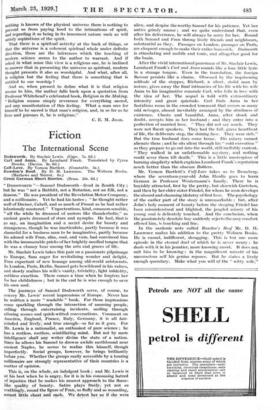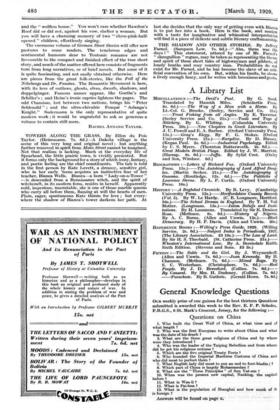Fiction
The International Scene
Dodsworth. By Sinclair Lewis. (Cape. 7s. 6d.) Carl and Anna. By Leonhard Frank. Translated by Brooks. (Davies. 3s. 6d.)
Cyrus
Calf-Love. By Vernon Bartlett. (Constable. 5s.) Great German Short Stories. (Semi. 10s. 6d.)
" Donswoirrn "—Samuel Dodsworth—lived in Zenith City ; but he was " not a Babbitt, not a Rotarian, not an Elk, not a deacon." He was.president of the Revelation Motor Company, and a millionaire. Yet he had his tastes ; " he thought rather well of Dreiser, Cabell, and so much of Proust as he had rather laboriously mastered." Unpretentious, kind, common-sensible, " all the while he dreamed of motors like thunderbolts," as ancient poets dreamed of stars and nymphs. He had, that is to say, an imagination and a secret desire for beauty and strangeness, though he was inarticulate, partly because it was shameful for a business man to be imaginative, partly because his adored wife Fran, slim, cool, and vain, had convinced him with the innumerable pricks of her brightly needled tongue that he was a clumsy bear among the arts and graces of life.
Mr. Sinclair -Lewis takes this pair on a passionate pilgrimage to Europe, Sam eager for revitalizing wonder and delight, Fran expectant of new homage among old-world aristocrats. In London, Paris, Berlin, Samuel gets bewildered in his values, and slowly realizes his wife's vanity, triviality, light infidelity, ruthless exaction. There comes a time when he forgives her for her childishness ; but in the end he is wise enough to save his own soul.
The journeys of Samifel Dodsworth serve, of course, to convey Mr. Lewis' recent impressions of Europe. Never has he written a more " readable " book. For those impressions come sparkling through the interaction of amusing people, sidling through entertaining incidents, smiling through alluring scenes and quick-witted conversations. Comment on America, England, France, Italy, Germany, it is all fair- 'minded and lively,' and true enough—so far as it goes. For Mr. Lewis is a rationalist, an enthusiast of pure science ; he has a restless, rootless, scintillating mind. But not by mere intelligence shall' any writer divine the state of a nation. Since he allows his Samuel to drowse awhile earthbound near ancient Naples, he seems to realize this himself, though imperfectly. Social groups, however, he brings brilliantly before you." Whetheethe groups easily accessible by a touring
millionaire are strongly representative of their countries is a matter of opinion. - This is, on the whole, an indulgent book ; and Mr. Lewis is at hi-s beat when he is angry, fOr it is in his consuming hatred of injustice that he makes his nearest ap-proachlo the flame- like quality of beauty. Satire plays freely, yet not so 'scathingly, "round the figure of Fran, so fluffy and so wounding,
arrant little cheat and snob. We detest her as if she were
alive, and despise the worthy Samuel for his patience. Yet her antics grimly amuse ; and we quite understand that, even after his deliverance, he will always be sorry for her. Round both Samuel and Fran throng lively friends and neighbours, substantial as they. Passages on London, passages on Paris, are eloquent enough to make their exiles homesick. Dodsworth is stimulating and mobile and tonic, and altogether good for the brain.
After the vivid international panorama of Mr. Sinclair Lewis, Leonhard Frank's Carl and Anna sounds like a lone little lyric in a strange tongue. Even in the translation, the foreign flavour persists like a charm. Obsessed by the imprisoning solitude of the steppes, Richard, a silent, stolid man by nature, gives away the final intimacies of his life with his wife Anna to his imaginative comrade Carl, who falls in love with the idea of her. The sequel is told with extraordinary intensity and great quietude. Carl finds Anna in her fastidious room in the crowded tenement that covers so many odd tninages, almost inevitably arranged by the straitness of existence. Chaste and beautiful, Anna, after shock and doubt, accepts him as her husband ; and they enter into a perfection of married love. " They did not say much. They were not fluent speakers. They had the full, grave heartbeat of life, the deliberate step, the shining face. They were rich." But the true husband does come home. His misery cannot alienate them ; and he sits silent through his " cold execution " as they prepare to go out into the world, still ineffably content. " They walked in an unfathomable mystery, and nothing could sever them till death." This is a little masterpiece of burning simplicity which explains Leonhard Frank's reputation much better than the obscure Robbers.
Mr. Vernon Bartlett's Calf-Love takes us to Bromberg, where the seventeen-year-old John Hardie goes to learn German in Professor Westermann's family. There he is boyishly attracted, first by the pretty, but shrewish Gretchen, and then by her elder sister Friedel, for whom he soon develops the absurd and charming idolatry of first love. The psychology of the earlier part of the story is unremarkable ; but, after John's holy moment of beauty before the sleeping Friedel has been misunderstood and blighted, the jangled misery of his young soul is delicately touched. And the conclusion, when the passionately desolate boy suddenly rejects the easy comfort offered him, is touching and fine.
In the sardonic note called Rawdon's Roof Mr. D. H. Lawrence makes his addition to the pretty Woburn Books. He is casual, indifferent, shrugging. This is but one more episode in the eternal duel of which he is never weary : he deals with it in his jauntier, more knowing mood. It does not suit him to be knowing : in the magnificent naiveté of his unconscious self his genius reposes. But he states a lively enough quandary. Make what you will of the " witty wife," and the " wolfless house." You won't care whether Rawdon's Roof did or did not, against his vow, shelter a woman. But you will have a charming memory- of two " clove-pink-half- opened " children, effortlessly singing.
The enormous volume of German Short Stories will offer new pastures to some readers. The tenebrous edges and sentimental humours dear to Teutonic romance are not favourable to the compact and finished effect of the true short story, and much of the matter offered here consists of fragments torn from long narratives, or of brief novels. But some of it is quite fascinating, and not easily obtained otherwise. Here are pieces from the great folk-stories, like the Fall of the Nibelungs and Dr. Faustus. The Romantic Movement is here, with its love of outlaws, ghosts, elves, dwarfs, shadows, and doppelgfinger. Famous names appear, like Goethe's and Schiller's ; and Heine's ironic caprice lightens the pages. The odd Chamisso, lost between two nations, brings his " Peter Schlemihl " ; and the ultra-chivalric Fouque " Aslanga's Knight." Sudermann is the only representative of quite modern work ; it would be ungrateful to ask so generous a volume to contain still more.
RACHEL ANNAND TAYLOR.

















































 Previous page
Previous page